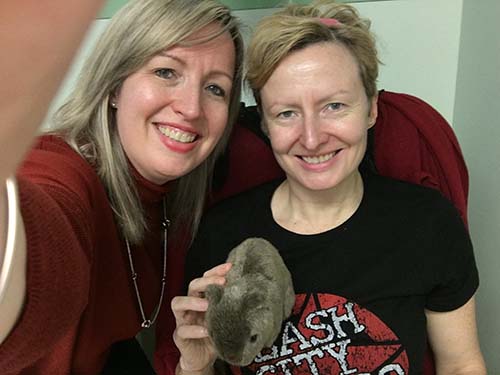My stroke by Vanessa Muir
It was an otherwise ordinary Saturday in London – plans for a barre class, some errands, followed by Thai food and movies with some Oz friends. I didn’t get beyond the barre class.
In the middle of class my leg suddenly became completely unresponsive. It was numb, vaguely tingly and completely unable to move. My first thought was, “I wish this wasn’t happening”. But it was, and I knew something had gone badly wrong in my brain, specifically the left hemisphere. My father had had brain surgery to remove a haematoma from his left frontal lobe six years earlier, so I checked myself against his symptoms and problems – memory (I could remember where I was and what I’d done the last few days), and I checked language (I could understand what the instructor was saying). But I knew I needed medical help immediately. The instructor helped me from the room, and the girls at the front desk called the paramedics.
I was incredibly lucky – conscious and surrounded by people when it happened, able to communicate, right in the middle of London, with paramedics were there within minutes. Despite not exhibiting any of the classic FAST signs – face, arms, speech (though my right arm started to go a bit wonky) – I was in hospital and through a CT scan within 45-50 minutes of it happening.
Movement was knocked out down my right side from my right shoulder down, but somehow miraculously didn’t get my hand. My speech and language were not affected. I could swallow, eat and drink on my own. My overwhelming feeling the entire time was of gratitude for what I considered to be incredible good fortune – amid some shock. But, overall, I felt incredibly lucky.
I had 2.5 weeks in hospital, which was admittedly a short stay – I was fast-tracked out, due to my progress, and the fact that my sister, Antonia, flew over from Australia to look after me for two months. However, I only ‘walked’ for the first time four days before I was released, and had only walked up 11 stairs once, two days before. To get into my flat, I had to get up no less than 46 of them! The minute I saw my building, nothing was going to stop me from getting up there, not even drop foot and the complete lack of a hamstring.
Once home in my flat, with modifications put on place by the OT, I received 6 weeks of near-daily rehab at home (physio, OT, psychotherapy), which got me back walking, albeit gingerly, with a stick and foot/ankle support. I also had the daily challenge of negotiating those 46 steps up and down from my flat!
It still surprises me somewhat how you are rather left on your own, in many ways, to figure it out and motivate yourself. Two months after admission to hospital with the stroke, the majority of my official rehab was done, and I was on a two-month-long waiting list for the “Adult Community Rehab Team”, who would have been in charge with seeing me only sporadically to help me with my next goals: getting back on public transport, back on a bicycle, and back to work. However, instead of staying in London on my own, in the cold, and with never-ending bills to pay, I let out my flat and came back to Australia – my sister had to go back to work, and I wanted to see my parents and friends here.
Over a year later, the rehab is still ongoing, shifting every now and then to keep things challenging, both physically and mentally. I’m incredibly grateful for how much recovery I’ve made, and everyone who has been there for me along the way, but there’s still a way to go.
Until this happened, I was rather ignorant of just how exactly strokes ‘work’ – causes, contributing factors, and just how devastating they are, all-too-often deadly (especially since mine was haemorrhagic). It’s rather alarming how little people know about it – risk factors, prevention; that it is not that uncommon for younger people to have them; and how little understanding there is in general of what it means to have had one, particularly the range of neurological impacts it has, that no two strokes are the same, that there is no one path for recovery (in fact, recovery is never assured), and just how incapacitating cognitive fatigue and sensory overload can be. Overall, it seems that the accompanying problems are usually assumed to be solely physical.
I never could have made the progress I have if my sister hadn’t been able to take so much time out of her life to help me, if my friends in London hadn’t been so upbeat and supportive, running endless errands and helping me out before my sister got there, as well as while she was there. Laughter and social interaction was – and is – incredibly important (so long as it is managed so as not to cause fatigue). You have to keep trying new things, look at the bright side, and concentrate on your progress and what is possible. No matter how hard it gets, you cannot give up.

